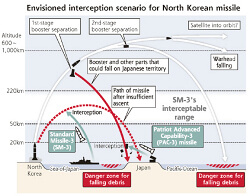Former Prime Minister Jun’ichiro Koizumi, who made privatization of Japan Post his line in the sand in the run-up to the 2005 snap election, isn’t pleased with current Prime Minister Taro Aso’s performance on the subject:
On 12 February, Former Prime Minister Jun’ichiro Koizumi of the LDP made his greetings at a gathering held at party headquarters to call for progress in Japan Post privatization and roundly criticized a series of pronouncements by Prime Minister Taro Aso related to Japan Post privatization: “If there’s no trust in the prime minister’s statements, we won’t be able to put up a good fight in elections.”
Koizumi censured the prime minister for his statements, saying, “I’m flat-out disgusted–to the point that I want to laugh more than get angry.” He indicated that “the way things have been recently, it makes me wonder whether the prime minister hasn’t since before been taking shots at people who are trying to do battle (in the lower house election).”
Among other things, Aso has contended on NHK that the apportionment of the privatized Japan Post has not been settled–which is to say, people knew Japan Post was to be privatized, but not that it was to be divided into four subsidiaries (retail bank, insurance, distribution/conveyance of letters and parcels, and window services/storefront operations) under the holding company.
I’m not sure how it’s possible to think such a thing. The structure of the new Japan Post was debated, and debated, and debated. Japanese news yak shows, which love flow charts, diagrammed it. If there were people who didn’t understand that the proposed structure was a sticking point, that’s their problem.
Of course, the bill that passed was a compromise, meaning that those of us who supported privatization rather than “privatization” were given cause for worry. The government is supposed to spin banking and insurance off completely by 2017 and to retain a one-third stake in the postal operations, but a lot can happen in a decade. From the moment the privatization bill was drafted, its lack of provisions against mutual shareholding raised fears that the four new companies would find a way to remain shackled to each other. There was a bill introduced in 2007 to freeze the selling off of stakes and assets; it passed the upper house, which is in control of the opposition. And the bank (Yucho) and insurance (Kampo) arms have been pushing to compete in the marketplace with their private counterparts, which lack the advantages of continued government stakes and brand assocation.
Yucho is also the world’s largest bank by assets. Together with Kampo, it holds roughly a quarter of Japanese household assets (lots of federal bonds, too). But having been a branch of the government and then a semi-public corporation gives Japan Post Holdings and its hatchlings additional potential for collusion and sweetheart deals. The selling off of group of hotels owned by Kampo was canceled after allegations that the bid was far too low. The postal part of the operation has been busy, too. Japan Post Holdings had existed for approximately three nanoseconds when it made a deal with Nittsu (Nippon Express) to consolidate parcel services. The new brand name (it’s the Obama Era now, so maybe イエス郵ペリカン?) debuts later this year. There was serious discussion of mutual shareholding, too. Who wouldn’t want to get in on infrastructure initally set up by the government and still bearing its imprimatur?
To be competitive without falling back on their state-controlled history, the service companies are going to need to streamline their operations, but the closures and firings that would be necessary to do so have been hotly contested. The old postal service had unprofitable outlets throughout rural Japan, but they became not only embodiments of its mandate to serve all citizens equally but also fiefdoms for ill-supervised local postmasters, who repaid the LDP by drumming up votes in the countryside to help keep it in power. The LDP has more free-market supporters than the opposition, which isn’t saying much to begin with, but many officials are wary of biting the hand that has fed them for so long.
